We’re all looking for the “Ultimate Marketing Plan,” one brilliant, easy-to-follow masterpiece that will magically deliver our most profitable, qualified and easy-to-work-with customers like clockwork.
And we all want to believe in a classic by the master marketer Dan S. Kennedy. We’ve taken his courses, flocked to his events, and sweated through his mastermind groups and hot seats.
So, does the book deliver on the implied promise in the title?
Not quite.
But it’s worth reading anyway.
John, Mickey and I will tell you why.
Listen here:
[smart_track_player url=”http://traffic.libsyn.com/aviationmarketing/Book_Club_-_Ultimate_Marketing_Plan_.mp3″ background=”default” ]
Transcript: Aviation Marketing Book Club – The Ultimate Marketing Plan by Dan S. Kennedy
Paula Williams: Thanks for joining us for this week’s episode. I’m Paula Williams.
John Williams: I’m John Williams.
Paula Williams: And we are ABCI and ABCI’s mission is…
John Williams: to help all of you ladies and gentlemen out there in the aviation world sell more products and services.
Paula Williams: Absolutely. And to that end, we have a book club.
John Williams: Yeah, we [inaudible 00:00:25] and discuss books.
Paula Williams: Absolutely. And our book-
John Williams: And the authors.
Paula Williams: And the authors. And some of them, the authors, we actually know, which is kind of cool.
John Williams: Exactly.
Paula Williams: And this month is no exception. We have Dan Kennedy’s The Ultimate Marketing Plan, which is a classic in the sales and marketing category. And we talk about what we love and don’t love about the book. And our Mickey Gamonal is our book club facilitator and does a great job of narrating these things. So before we get into that, this episode [inaudible 00:01:00] to you by our Aviation Sales Basics Course, which we’re doing a grand reopening for in August. August 1st is our next iteration. So if you want to reserve a seat, we are doing limited seating so we can give everybody lots of attention and things like that. So we developed the course because of what we do in marketing, right?
John Williams: Yeah. It’s self-defense.
Paula Williams: Self-defense. We’re finding that in a lot of cases we’re developing a lot of leads or a lot of prospects for the companies that we work with. And then they may not have people on staff who are comfortable calling these people and furthering the sales process and being that human connection that they need.
John Williams: They don’t understand sometimes the difference between cold leads and warm leads and why it should be more comfortable calling the people that want to be called.
Paula Williams: Exactly. And the difference between being a professional sales person and being a used car salesman or the difference between being a professional salesperson and being an order taker, both of which are equally annoying to your customers, right? Okay.
Paula Williams: So this course will help you close a lot more sales and feel a lot more comfortable picking up the phone and closing those sales and making those connections and building those relationships. So you can reserve your seats anytime now through August 1st will be our next iteration and then we’ll probably be doing it quarterly or semiannually depending on demand.
John Williams: Without further ado…
Paula Williams: Let’s jump right in.
First Impressions
Mickey Gamonal: Thank you for joining us a with ABCI’s book club. Today we were talking about The Ultimate Marketing Plan. This is a good book. It’s good in the fact… well before I get into it, let me just say that I finished most of it and I liked it for the most part, but I want to know what you guys think. So let’s start. Last time we started with mom, this time we’ll start with John. Go ahead.
John Williams: Well, there was a lot of stuff in there, but I think it got I guess I’ll say too techie. It’s the, you have to, if you know what you’re reading then it’s easy, it’s good. But if you’re a newbie, it’s going to be kind of confusing I think. But that’s just my take on it. I liked a quote again.
Mickey Gamonal: Just go for it. Hit it.
A Big Discount Needs a Believable “Reason Why”
John Williams: He’s talking about creating short term sales surges. And on page 145 and he says in big bold print, “Big discount, believable reason why. So you want to make short term sales and you say excess inventory, out of date inventory, service time during the off season. You’d see all this stuff all over stores all over town. Such merchandise can often be sold at big discounts, but it’s important to remember the current high level of skepticism and cynicism of your public, i.e. me, when I’m going around town and see all this stuff all over the stores. Outstanding discount offers just fall miserably because the intended buyers smell a rat.” And this is exactly correct. And then it goes on to say, if you’re running a fire sale, make sure they see the charred timbers and so on.
John Williams: But that was just, that whole section I thought was, hit the nail on the head, not just for people’s small businesses, but owners of larger brick and mortar stores and so on. Guilty, guilty, guilty.
Paula Williams: In San Francisco, we were just recently there and every time we go to San Francisco, which is a tourist town, you get a lot of people that come and go. So a lot of people who’ve never been there before and they see this antique store on the pier. So they’re thinking, oh great, this is stuff from ships that’s just been unloaded and they’re going out of business and what are the chances that I would be here on the day that they’re going out of business? Every time we’ve been to San Francisco, this place has been going out of business. And we go pretty frequently, right? So…
John Williams: They’ve been there since I have lived in San Francisco.
Paula Williams: Right. And they’ve been going out of business and have things 70% off forever. And then they change the name of the company and they do the same thing again. And it may be believable to their target market, which is the just off the boat tourists, the cruise ship folks and things like that that have never been to San Francisco before and maybe their English isn’t so good. But it’s not something that… I guess a tactic known is a tactic blown, right?
Mickey Gamonal: Yeah, no, absolutely. Yeah. No, I think you’re right. I think especially for you guys in the aviation business, I would imagine the majority of people hold onto their money pretty tight and if they can see a reason not to buy from X or Y, that will be their excuse. That will be their reason. Oh, this seems false. If you go around every month saying, “Hey, we have a fire sale,” who’s going to believe that it’s really a fire sale? And especially if it comes in waves, which a lot of businesses do.
Mickey Gamonal: For me, I have a subscription to this business called the House Seats where they give me free tickets to shows on a subscription basis. And I will wait until they go through their annual sale to go out and purchase my subscription because I know eventually that there’s a better deal coming along. And if you are out there saying, “Hey, we’re going to set you up because of X, Y or Z,” you should probably make it very clear that you’re being honest because people do look for dishonesty. They look for a reason not to buy. So I think that that’s a really good point.
Paula Williams: There was a lady that used to sell, and I’m not going to get into names or anything else, but aviation is a really small world. And there was a lady that used to sell art at air shows and her backstory was that she had been a military pilot and had been one of the first female fighter pilots and all of these things and had this particular rank and had ratings and had been a test pilot in all these particular airplanes and things like that. You know what? There’s the internet and she got called on it on Facebook. She ended up having to delete her entire store and everything else because she was found out as being-
John Williams: A fraud.
Paula Williams: … dishonest and this makes no difference to the art that she was selling. I thought it was actually really nice looking paintings and things like that, but nobody would want to own one if they knew that she had been selling this backstory and that’s part of what you buy when you buy art, right?
Mickey Gamonal: Absolutely. Imagine you’re showing your friend this piece of art and you’re telling the story that probably came in a cool little three by five index card with the painting that you bought and you’re explaining to them and they turn and look at you and say, “BS. Oh, that’s a lot of… she got found out as a fraud at the last trade show.” Wouldn’t you know it? All of a sudden that artwork is not doing what you wanted it to do. It is doing the absolute opposite. Whatever X amount of dollars you spent on the artwork has been not just wasted, but completely wasted. You wish that you never even considered making that purchase.
Paula Williams: Right. Imagine if you had that painting hanging in your law office or something like that. I want to have nothing to do with this person. That’s not something I want to be associated with.
Mickey Gamonal: Absolutely. Yeah. No. And again, we talk about ethical marketing and ethical business practices and things like that. And like I say, there’s enough money out there. You keep that growth mindset where there’s enough options, there’s enough customers out there that you can do what you want to do honestly. As long as you’re providing some sort of value here, you’re a million times better off.
Paula Williams: Right. I think she would have been much better off if she had told the story behind the airplane she had painted or behind the pilot that she was, the story that she was painting. That would be just as good and just as good of a reason to buy a painting than having to spin something that’s not true, you know? There’s plenty of great stories.
Mickey Gamonal: Absolutely. Absolutely.
Misleading Title?
Paula Williams: My biggest beef with the book was the title, The Ultimate Marketing Plan. It makes you think that it’s going to be complete, number one, and that it’s going to be a plan, which I think is kind of like a blueprint. And it wasn’t really that. You kept looking through it, looking for the plan. What’s the plan?
John Williams: [inaudible 00:10:38] in parts. And they didn’t even bother to try to weave them together.
Paula Williams: Yeah. It was kind of a progression and stuff and it was a set of steps. But it didn’t strike me as being… and I know Dan Kennedy is probably going to smack me for this, but, and we actually really enjoy Dan Kennedy. I’ve been on the hot seat in his panels before. He is not a nice person.
John Williams: He certainly is, just not in a business situation.
Paula Williams: Right, exactly. That’s what he’s famous for is that he’s really tough on people. So I’m going to be tough on him cause that’s fair, right? And I think that’s the problem with the book. I think the title is false advertising. I think it gives people the impression that there’s going to be a blueprint that you can follow and it’s going to be like the blueprint to a house. This goes here, this goes here, you put it all together and it’ll work. And I don’t necessarily think that’s what the book is, which doesn’t mean that it doesn’t have value. It’s just not really a plan.
John Williams: Yeah, exactly.
Four Marketing Sins
Mickey Gamonal: No, I agree. It’s, it, I can kind of hear his voice in it, too. He definitely does read very intense. And it’s another one of those books where it’s just like, boom, boom, boom, boom, boom. It’s not super user friendly. I mean, maybe more if you have the marketing background where you can agree and consider each statement. But if you don’t have a marketing background and you’re going through this, it’s a lot of jarring statements. You need to do this now. And you need to do that yesterday. And it’s just in your face all the way throughout. But I do want to highlight at the end of the book. I love it when authors do this where they say their ultimate things. They say the general things.
Mickey Gamonal: So there’s four marketing sins. One is being boring. Two is wasting your weaponry aiming at the wrong targets. Three is taking your customer’s loyalty for granted. And four is letting the customer leave angry without first exhausting every means at your disposal to resolve the dispute.
Mickey Gamonal: So I’m happy that at the very end of the book, he acknowledges his specific grandiose ideas, very, just single statements, boom, boom, boom, boom, rather than chapter to chapter just looking over here and then looking over there. It’s just so much information that it gets so intense. But I like at the end of the book where he just kind of simplifies it and draws it out and I really like the amount of information for sure.
Paula Williams: Right. It was a nice finish on that book. And that was I think my favorite part is the four marketing sins. I mean if you just don’t do that, you’re going to give me a thousand times better. And I would add, random acts of marketing, which I know he talks about in other books. I don’t know why that wasn’t one of his sins. Maybe it was wasting weaponry was kind of a random act of marketing. But I think that’s a nice way of putting it.
Dan S. Kennedy – Story and Style
John Williams: Well the thing about Dan is he started off door-to-door sales and everything you read about in his book is for real. He experienced it, he learned from it. He takes teaching you how to get around it and how to use it to your best advantage. You may not like his style of presenting the data, but he’s right on. And he’s made himself a millionaire several times over.
Paula Williams: Oh yeah, he charges, I think, I don’t know what his rates are nowadays. I think it’s over, in the hundreds of thousands a day for a consulting day and you have to book four days in a block and it’s six months in advance. So obviously what he’s doing is very successful for him. He’s come from nothing and made this business for himself. So you can’t argue with success. And he, like Gary Vaynerchuk, I think is jarring for effect and it works for them. So I can’t argue with that either. So just not my style.
Mickey Gamonal: Yeah, no, definitely. He seems very, very intense, but very accurate, definitely a tone of finality in each sentence.
Paula Williams: This is the way it is. And these are the seven deadly sins or the four deadly sins, right.
Mickey Gamonal: Yeah. I mean, it is, it’s kind of commandment based, which is off-putting for your Twitter startup guy who’s just eating pizza and longboarding across campus. But the accuracy can’t be argued with. I think you’re right on that. Overall pretty, pretty solid book for me.
Thumbs Up? Thumbs Down?
Paula Williams: Excellent. So thumbs up, thumbs down?
Mickey Gamonal: I would, I’d give it a thumbs up, probably 75%. It’s not something I would recommend to a kid at a lemonade stand, but it’s probably pretty good for anybody who’s actively marketing in today’s world.
Paula Williams: Smart.
John Williams: I think it needs to be something you would read after you’ve been through business school and realize they don’t know what they’re talking about in marketing classes.
Mickey Gamonal: Right. After you’ve thrown out the first pancake.
John Williams: Pretty much.
Mickey Gamonal: And how about you, mom? What’d you think?
Paula Williams: I have to give it a thumbs up just because it is very high quality material, but it is not what I would call a marketing plan. I hope this is not somebody’s first book that they read about the topic. And so yeah, I totally agree with your assessment about the… your recommendation for read something else first, read Seth Godin first, read somebody else first.
Mickey Gamonal: Yeah, I can agree with that. Well, cool. Sweet.
Paula Williams: Thanks for joining us. This episode once again has been brought to you by our Aviation Sales Basics Course. If you or your team need to build the confidence and or the skills to sell more aviation products or services, and that includes charters, brokers, [inaudible 00:17:08], flight schools, all that stuff, then reserve your seats now. This episode has also been brought to you by Gamonal Tutors who can help you with test prep, with your kids having issues in school, all kinds of things. Anything having to do with math in the Las Vegas and or Skype Universe, which pretty much includes everybody. So looking forward to seeing you next time.
Book Club Discussion – Marketing Made Simple by Donald Miller
Join Paula, John, and John Davies, aircraft appraiser and owner of JAMM Aircraft appraisals. JAMM's adorable canine VP, Chewy, also makes an appearance. We discuss Marketing Made Simple by Donald Miller, why the simplest [...]
Book Club Discussion – This is Marketing by Seth Godin
This is Marketing by Seth Godin is actually the third Seth Godin book we've reviewed in our Book Club - (We've also read Tribes and All Marketers Tell Lies.) Paula Williams, John Williams and [...]
Book Club Discussion – LIFT with authors John & Martha King
We had a visit from aviation industry royalty as John & Martha King joined our Book Club Discussion this month. We discussed their new book LIFT, about our favorite subjects - aviation, business, marketing [...]
John and Martha King Will Join Us For Our Book Club Discussion
John and Martha King will be joining us for our Book Club Discussion this January. We're excited to talk with them about two of our favorite topics - aviation and entrepreneurship! Already in our [...]
Book Club Discussion – Hook Point by Brendan Kane
Hook Point: How to Stand Out in a 3-Second World by out-of-the-box thinker Brendan Kane breaks down the most effective strategies to generate new opportunities, innovate and scale your business, and create a compelling [...]
Book Club Discussion – H2H Marketing with Author Waldemar Pfoertsch
We were thrilled to have author Waldemar Pfoertsch join us to discuss the book H2H Marketing. We were inspired by Professor Waldemar's animated and funny discussion. "We believe marketing can change the world for [...]

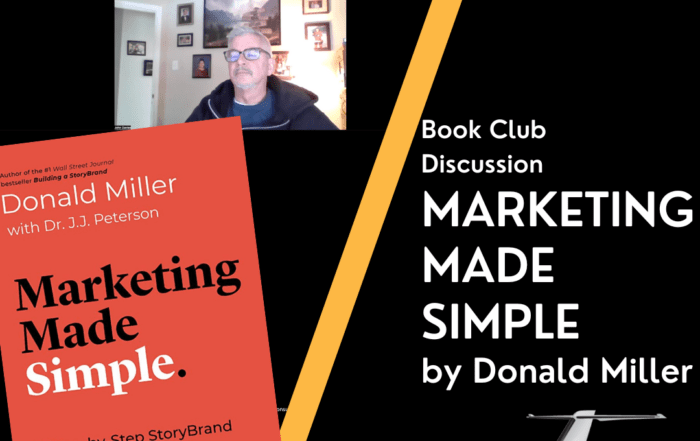
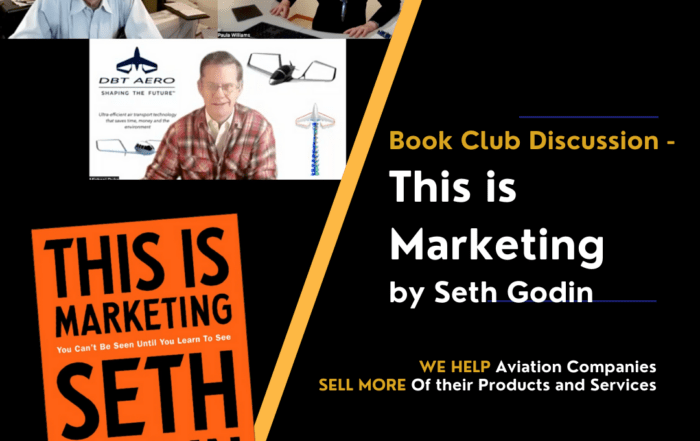
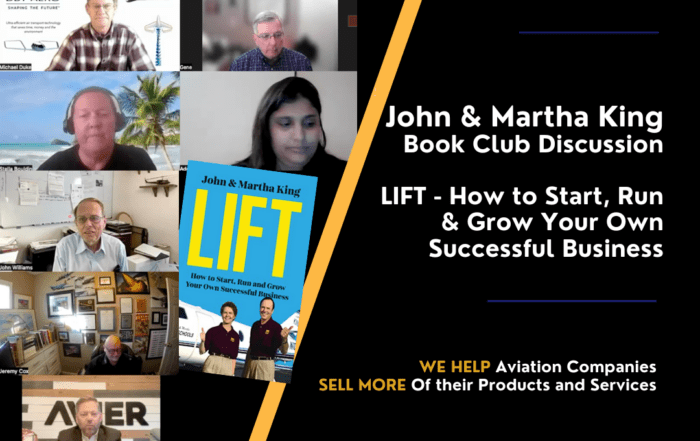
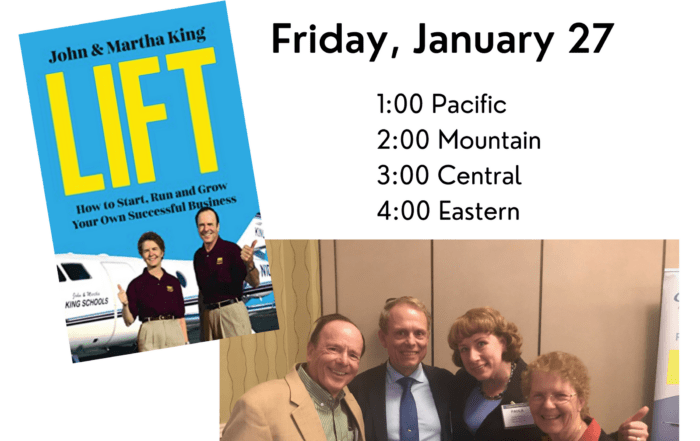
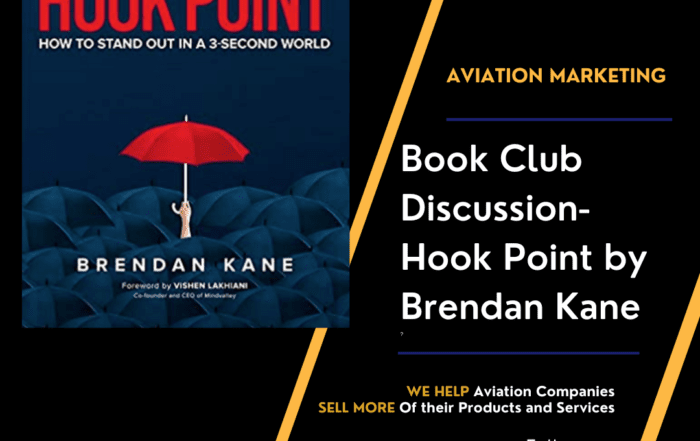
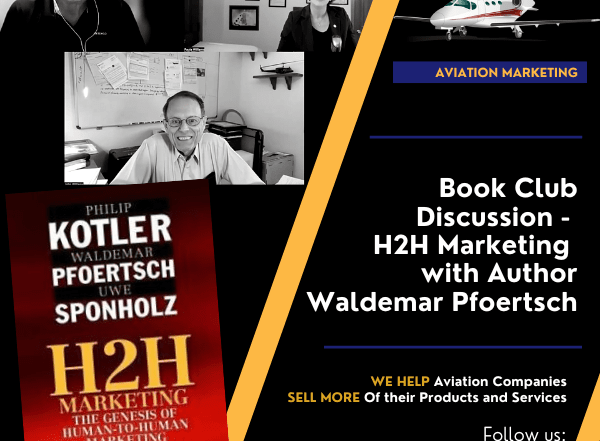
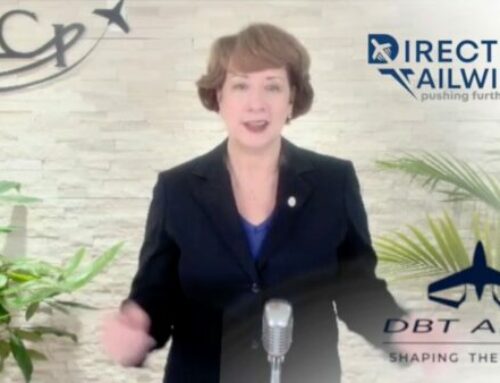
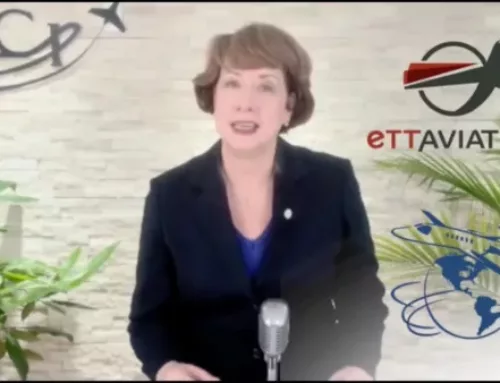
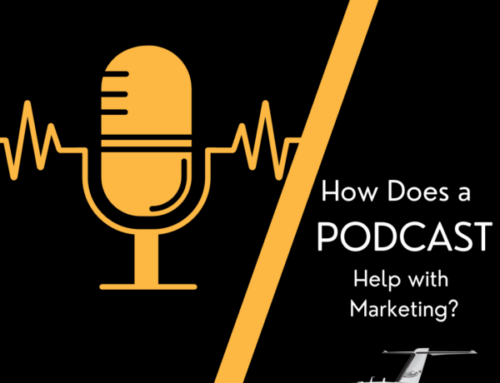
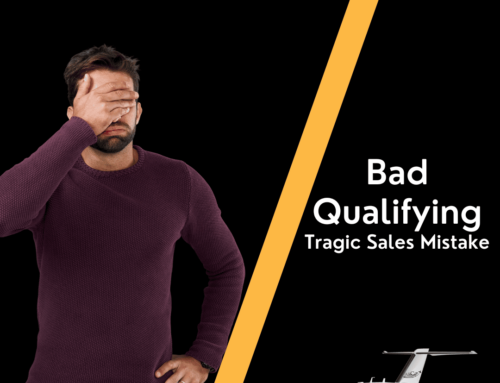

I’m so glad that I cam across this! I am a huge Dan Kennedy fan (as of 4 months ago). I started devouring all of his content. One of the things he recommends is using bait to attract customers. I think webinars are perfect forms of bait. There’s a free course on The New York Banner about using webinars to convert visitors into customers!